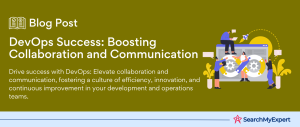DevOps for Mobile App Development
What is DevOps?
DevOps, a portmanteau of “Development” and “Operations,” revolutionizes software development and delivery. It’s a methodology, a culture that amalgamates software development (Dev) with IT operations (Ops), aiming to shorten the development life cycle while delivering high-quality software continuously and efficiently.
Core Principles of DevOps:
- Collaboration:
The heart of DevOps lies in breaking down silos between teams. It fosters a culture where developers, operations staff, and even quality assurance work in unison, promoting transparency and mutual responsibility. - Automation:
DevOps heavily relies on automating repetitive tasks. This includes everything from code integration, testing, to deployment, enabling faster and more consistent outputs. - Continuous Feedback:
It’s all about iterative improvement. Regular feedback loops are established, ensuring that any glitches are swiftly identified and rectified, thereby enhancing the quality of the final product.
Addressing Mobile App Development Challenges with DevOps:
Traditional mobile app development often grapples with issues like slow release cycles, siloed teams, and inconsistent environments between development and production. DevOps steps in as a game-changer by:
- Accelerating Time to Market:
By automating and streamlining processes, DevOps reduces the time taken from conceptualization to market release. - Improving Collaboration:
Breaking down barriers between departments ensures a smoother development process, with less miscommunication and more synergized efforts. - Ensuring Quality: Continuous integration and testing mean that bugs are caught and fixed early, leading to a more stable and reliable app.
- Adapting to Change:
With continuous feedback loops, developers can quickly respond to market changes or user feedback, making the app more relevant and user-friendly.
DevOps isn’t just a set of practices; it’s a paradigm shift that brings agility, quality, and innovation to mobile app development. By embracing DevOps, organizations can overcome the bottlenecks of traditional methodologies and thrive in today’s fast-paced digital landscape.
Benefits of DevOps for Mobile App Development
The infusion of DevOps in mobile app development is akin to adding a turbocharger to an engine. It boosts efficiency, performance, and output quality. Here’s how:
Faster Release Cycles and Time to Market
- Streamlined Workflows: Automation is king in DevOps. By automating tasks like builds and testing, time is saved, and errors are reduced.
- Continuous Integration & Delivery: DevOps enables developers to integrate their code into a shared repository frequently, leading to quicker release cycles.
- Resilient Operations: With infrastructure as code (IaC) and other DevOps tools, setting up and maintaining the production environment becomes faster and more reliable.
Improved Quality and Stability of Mobile Apps
- Early Bug Detection:
Continuous testing in DevOps ensures bugs are spotted and fixed early in the development cycle. - Consistent Environments:
The use of containerization and orchestration tools ensures that the app runs consistently across all environments. - Proactive Monitoring: With DevOps, monitoring is ongoing, leading to immediate detection and resolution of issues, thus enhancing app stability.
Reduced Costs and Increased Efficiency
- Efficient Resource Utilization:
Automated pipelines and streamlined processes mean less manual intervention, reducing labor costs. - Reduced Downtime: Quick deployment and rollback mechanisms mean less downtime, which in turn reduces the cost associated with outages.
- Scalable Infrastructure: Cloud-native tools used in DevOps enable efficient scaling, thus optimizing infrastructure costs.
Enhanced Collaboration between Development and Operations Teams
- Breaking Silos:
DevOps encourages a culture where devs, ops, and QA work together, reducing miscommunication and increasing productivity. - Shared Responsibility:
It’s no longer ‘your code, my problem.’ DevOps fosters a shared responsibility model, where the whole team owns the software lifecycle.
Continuous Feedback and Iteration for Rapid Improvement
- Feedback Loops: Regular feedback from users and stakeholders is incorporated rapidly, ensuring the app remains relevant and user-friendly.
- Iterative Improvements:
With DevOps, improvements are continuous, not monumental, making it easier to adapt and evolve.
DevOps propels mobile app development into a new era of agility, quality, and efficiency. It’s not just about doing things faster but doing them smarter and better.
DevOps Tools and Practices for Mobile Apps
The DevOps toolkit is a treasure trove of technologies and practices that supercharge mobile app development. Let’s delve into some of these tools and practices:
Version Control Systems: The Backbone of DevOps
- Git:
A distributed version control system, it allows multiple developers to work on a project simultaneously without stepping on each other’s toes. - GitLab:
More than just version control, GitLab offers an entire DevOps lifecycle in a single application.
Continuous Integration and Continuous Delivery (CI/CD)
- Jenkins:
An open-source automation server, Jenkins helps in automating the non-human part of the software development process. - Fastlane: Tailor-made for mobile app development, Fastlane automates tedious tasks like generating screenshots and releasing applications.
- CircleCI:
This tool integrates with GitHub and GitHub Enterprise, automating the build, test, and deployment processes.
Configuration Management Tools
- Puppet: It enables developers and sysadmins to work together to build and manage infrastructure as code, providing control and consistency.
- Chef: This tool automates how infrastructure is configured, deployed, and managed across your network, no matter its size.
- Ansible:
Known for its simplicity and ease of use, Ansible automates software provisioning, configuration management, and application deployment.
Containerization Technologies
- Docker:
A platform for developing, shipping, and running applications in containers, allowing them to work consistently across different environments. - Kubernetes:
An open-source system for automating deployment, scaling, and management of containerized applications.
Monitoring and Logging Tools
- Real-time Insights: These tools provide visibility into the app’s performance, help detect and diagnose complex issues, and ensure that the app is always running smoothly.
Incorporating these tools into the mobile app development process not only streamlines workflows but also ensures that the final product is robust, reliable, and ready to meet the dynamic demands of users.
Implementing DevOps in Your Mobile App Development Workflow
Integrating DevOps into your mobile app development process is a transformative journey. It’s about embracing new tools, practices, and most importantly, a new mindset. Here’s how to get started:
Define Your CI/CD Pipeline
- Automated Builds:
Set up your pipeline to automatically compile and build the app whenever changes are made. - Automated Tests:
Integrate automated testing in the pipeline to catch bugs and issues early. - Automated Deployments:
Ensure that your app is automatically deployed to the relevant environment after passing tests.
Leverage Infrastructure as Code (IaC)
- Consistent Environments:
Use IaC to define and manage your infrastructure, ensuring consistency across development, testing, and production environments. - Scalability:
IaC makes it easier to scale up or down based on demand, ensuring efficient resource utilization.
Automate Manual Tasks
- Provisioning and Configuration:
Tools like Ansible or Terraform can automate the setup and configuration of servers and services. - Deployments: Automate the deployment process to reduce human error and speed up the release cycle.
Foster a Culture of Collaboration and Shared Responsibility
- Breaking Down Silos:
Encourage open communication and collaboration between developers and operations teams. - Shared Responsibility:
Ensure that both development and operations teams are equally responsible for the success and quality of the mobile app.
Implementing DevOps in mobile app development isn’t just about deploying new tools; it’s about cultivating a new operational ethos that values efficiency, quality, and collaboration. When done right, it can dramatically enhance the way mobile apps are developed and maintained.
Security Considerations in DevOps for Mobile Apps
Security in DevOps, often referred to as DevSecOps, ensures that security is not an afterthought but an integral part of the entire mobile app development lifecycle. Here’s how to weave security into the fabric of your DevOps practices:
Integrate Security Testing Throughout the Development Lifecycle
- Continuous Security Testing:
Implement tools that automatically scan for vulnerabilities in your codebase as part of the CI/CD pipeline. - Threat Modeling:
Regularly assess potential threats and vulnerabilities specific to your app and address them proactively.
Secure Your CI/CD Pipeline and Infrastructure
- Pipeline Security: Ensure that your CI/CD tools and processes are secured against unauthorized access.
- Infrastructure Security:
Use IaC to enforce security standards and configurations across your entire infrastructure.
Implement Vulnerability Management and Patching Procedures
- Regular Scans: Conduct regular vulnerability scans to identify and address security weaknesses.
- Prompt Patching:
Establish a system for quickly patching known vulnerabilities to minimize exposure to risks.
Follow Secure Coding Practices
- Coding Standards:
Adhere to secure coding guidelines to prevent common security flaws. - Reliable Libraries and Frameworks:
Use well-maintained and secure libraries and frameworks to reduce the risk of vulnerabilities.
Security in DevOps is not just about adding tools; it’s about building a culture where security is everyone’s responsibility. By embedding security practices into every stage of mobile app development, organizations can ensure that their apps are not just fast and functional, but also secure.
Measuring the Success of Your DevOps Initiative
To gauge the effectiveness of your DevOps initiative, you need to track specific metrics and continuously evaluate your processes. Here’s how to go about it:
Define Key Metrics
- Lead Time:
Measure the time taken from code commit to code successfully running in production. This indicates the efficiency of your delivery pipeline. - Release Frequency: Track how often you deploy new features or updates. A higher frequency suggests a more agile and responsive development process.
- Defect Rate: Monitor the rate at which defects or bugs are found in your production environment. A lower rate is indicative of higher-quality releases.
Track Progress and Improvement Over Time
- Baseline Measurements:
Establish baseline metrics before implementing DevOps to compare against future performance. - Continuous Monitoring:
Regularly review these metrics to assess progress and identify areas for improvement.
Conduct Regular Feedback Loops
- Iterate on Processes: Use the feedback from your team and metrics to make informed decisions about changes to your DevOps processes.
- Team Feedback:
Encourage feedback from all members involved in the development process to gain insights into potential bottlenecks or challenges. - Stakeholder Input: Include feedback from users and stakeholders to ensure that the DevOps process aligns with business goals and user needs.
Measuring the success of a DevOps initiative goes beyond just looking at numbers. It’s about understanding the value those numbers represent and how they translate into better software delivery and a more efficient development process.
Future Trends in DevOps for Mobile App Development
As we conclude our exploration of DevOps in the realm of mobile app development, it’s clear that this approach is not just a fleeting trend but a significant shift in the software development landscape. Here’s a recap and a glimpse into the future:
Recap of Benefits
- Faster Release Cycles:
DevOps accelerates the time-to-market for mobile apps by streamlining and automating the development process. - Enhanced Quality and Stability:
Continuous integration and testing lead to robust and reliable apps. - Cost Efficiency:
Automation and efficient resource utilization significantly reduce operational costs. - Improved Collaboration:
DevOps fosters a culture of shared responsibility and collaboration, breaking down silos between teams.
Emerging Trends: AI and Machine Learning in DevOps
- Predictive Analytics: AI and ML are being increasingly used to predict potential issues and optimize processes, making DevOps more proactive rather than reactive.
- Automated Code Reviews:
Machine learning algorithms can analyze code to detect anomalies and suggest improvements, enhancing code quality. - Intelligent Automation:
AI can automate complex, decision-based tasks, further reducing manual effort and improving efficiency.
Continuous Learning and Improvement
- Stay Informed:
The field of DevOps is constantly evolving. Staying updated with the latest tools and practices is key. - Iterative Process:
DevOps is about continuous improvement. Regularly evaluate and refine your practices. - Experimentation:
Don’t be afraid to experiment with new technologies and methodologies that could enhance your DevOps strategy.
Conclusion
DevOps for mobile app development is a journey of continuous evolution. As emerging technologies like AI and ML begin to play a larger role, the landscape of DevOps will continue to innovate, making it an exciting field to be a part of.
Maximize your operational potential with our DevOps Services.
Table of Contents
Toggle






